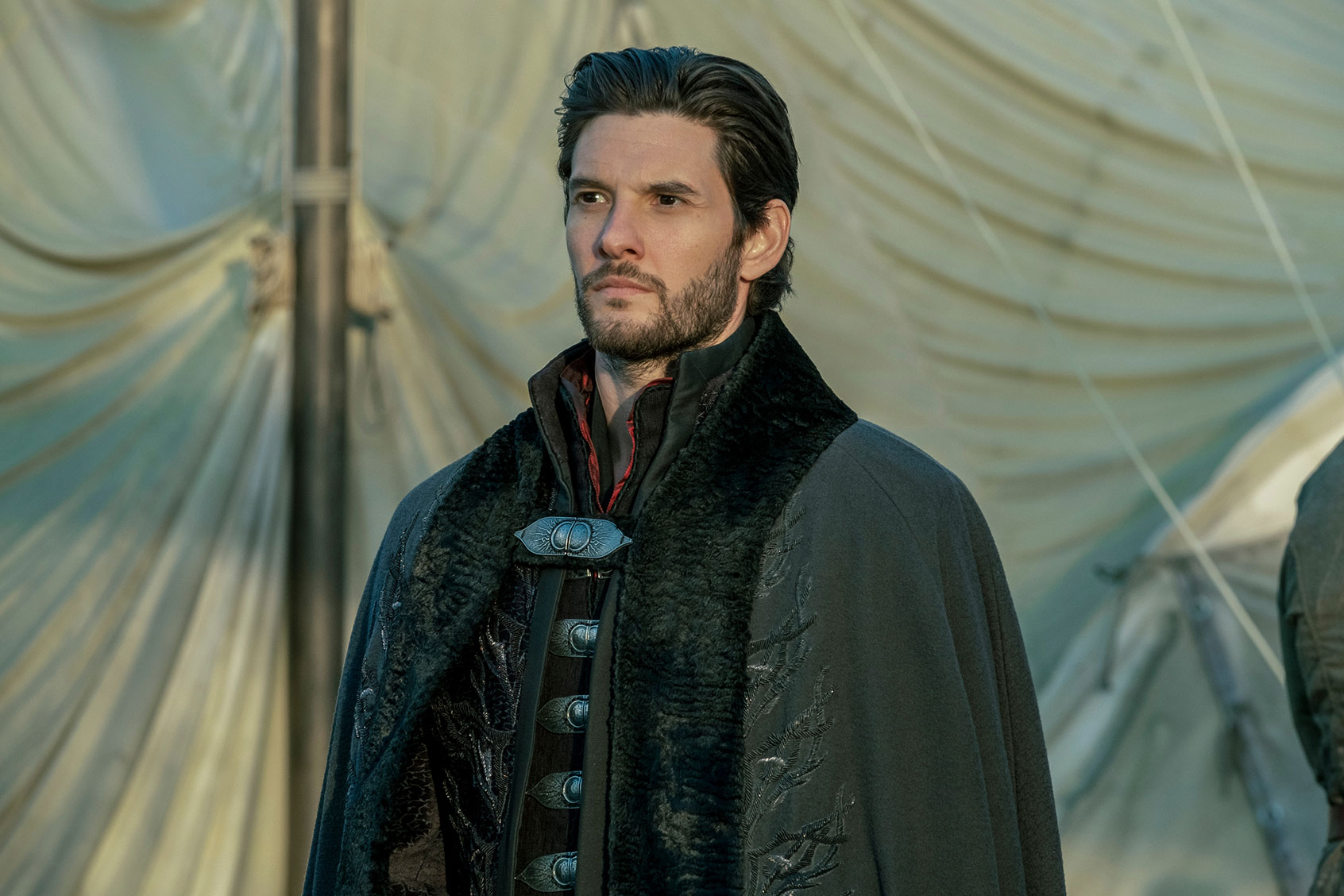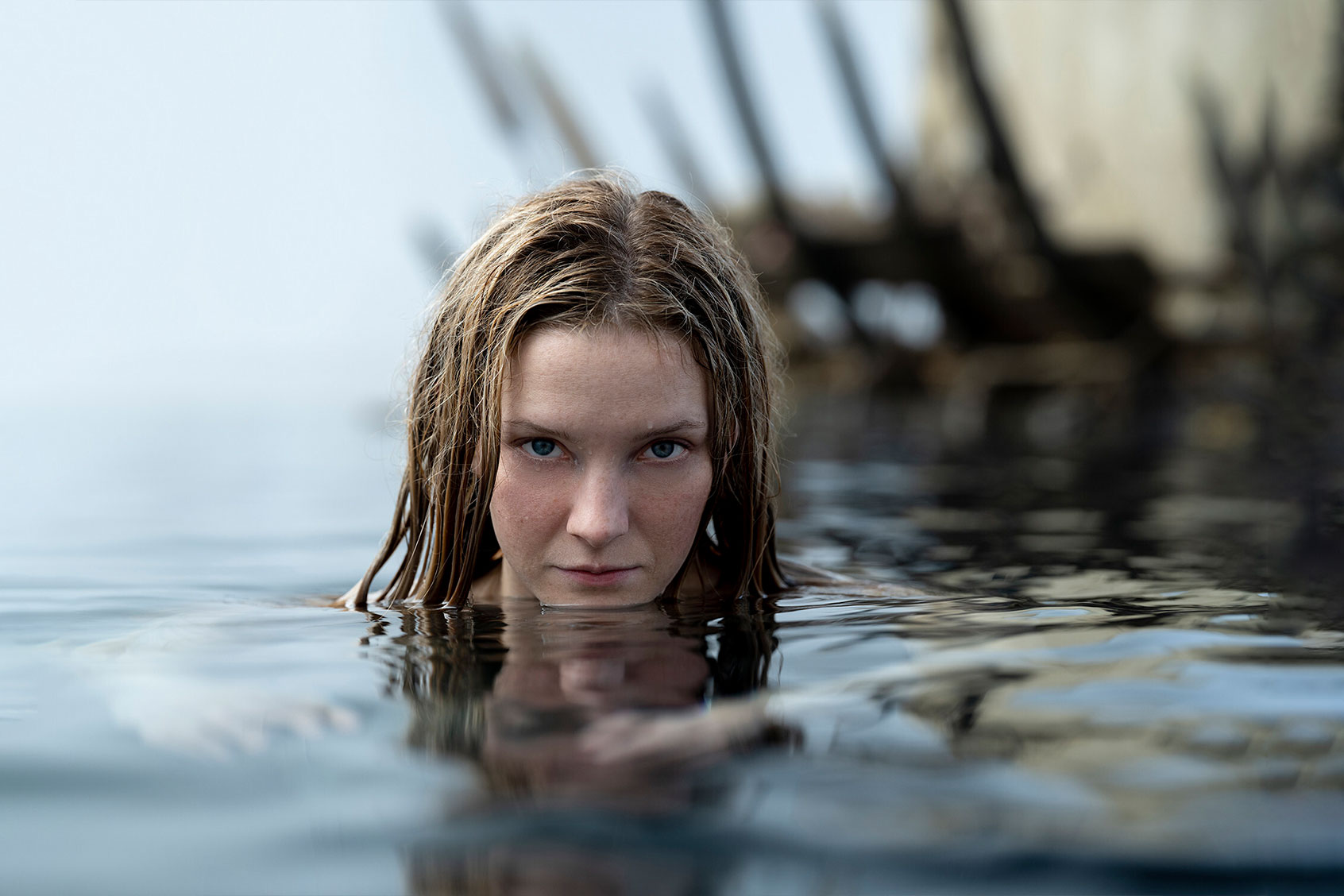Never trust the hunk.
For eight exciting — if sometimes overwritten — episodes, Prime Video’s new fantasy series “The Rings of Power” doled out hint after hint as to the identity of Sauron, the familiar villain of J.R.R. Tolkien‘s popular novel “The Lord of the Rings,” leaving viewers to play a game of Guess Who? each week. After an early fake out in the Season 1 finale, “Alloyed,” we finally learned the truth: It was Halbrand (Charlie Vickers) all along.
Brooding and mysterious, hunky and conflicted, he was written in a way that all but guaranteed viewers would be instinctively drawn to him.
A seemingly mortal man whom Galadriel (Morfydd Clark) encountered floating on a piece of wreckage on the Sundering Seas, Halbrand eventually — and rather reluctantly — left Númenor at Galadriel’s request to join her on her quest to find and stop, well, himself. It’s really quite funny when you think about it. But if we’re supposed to hate Sauron — and by all accounts, we should hate him, for we already know how evil he becomes and the danger he poses to the inhabitants of Middle-earth — perhaps the show’s writers shouldn’t have tried so hard to first make us love Halbrand.
For much of the inaugural season of the fantasy series, the character played like the show’s version of Aragorn (memorably portrayed by Viggo Mortensen in Peter Jackson’s film trilogy). Brooding and mysterious, hunky and conflicted, he was written in a way that all but guaranteed viewers would be instinctively drawn to him. His perceived role as the series’ reluctant hero is naturally appealing, while his apparent impenetrability is meant to draw us in and make us want to know more about him.
So when Galadriel identified him as the heir to the Southlands — without a shred of evidence beyond a piece of jewelry, which Halbrand claimed he took from a dead man — a part of us wanted to believe he was the heroic king who was promised. But at the same time, another part of us had to wonder if he was simply an illusion, perfectly designed to make us fall for him (it’s a very Hollywood thing to do to cast a good-looking man to trick us), so that when his true identity and nefarious objectives were eventually revealed we’d be shocked and emotionally devastated (it’s a pretty common trope).
 Charlie Vickers as Halbrand in “Lord of the Rings: The Rings of Power” (Prime Video)It turned out to be the latter. Only not all fans were shocked by the finale’s big reveal; there were hints that Halbrand was secretly Sauron throughout the first season, including the character’s interest in blacksmithing. Moreover, most viewers likely were not too emotionally devastated by this new knowledge given the many years TV has spent obsessing over the morally gray antics of anti-heroes in addition to just loving straight-up villains. If there’s one thing we know, it’s evil hotties with questionable intentions (see also: Netflix’s “You”). Still, one has to admit, it is a little unfortunate this is how things have played out.
Charlie Vickers as Halbrand in “Lord of the Rings: The Rings of Power” (Prime Video)It turned out to be the latter. Only not all fans were shocked by the finale’s big reveal; there were hints that Halbrand was secretly Sauron throughout the first season, including the character’s interest in blacksmithing. Moreover, most viewers likely were not too emotionally devastated by this new knowledge given the many years TV has spent obsessing over the morally gray antics of anti-heroes in addition to just loving straight-up villains. If there’s one thing we know, it’s evil hotties with questionable intentions (see also: Netflix’s “You”). Still, one has to admit, it is a little unfortunate this is how things have played out.
Introducing the primary antagonist of one of the most popular and best known fantasy epics in pop culture as an attractive, conflicted man has now allowed for the possibility that we might never quite view Sauron as the serious evil threat we all know him to be. In fact, it might make viewers sympathetic to him. And while it’s true this introduction doesn’t deviate too greatly from Tolkien’s work — Sauron appeared in disguise as the beautiful elf Annatar, Lord of Gifts, in order to influence the Elves and forge the Rings of Power — Halbrand was ready to stay in Númenor, so his deceit in the show is more calculated and deliberate, meant to fool not just Galadriel and Celebrimbor (Charles Edwards), but also the fans.
“If deception is an important part of the journey, we wanted to preserve that experience for book readers too,” co-creator Patrick McKay told Vulture after the Season 1 finale. “The idea that the shadow can take many forms was part of what we were attracted to.”
It’s also now impossible to fully hate Sauron.
This is all well and good, but there are aspects of this particular decision that the writers might not have fully considered when they decided on this plan of action, like Vickers and Clark’s chemistry, which has led to an army of Galadriel/Halbrand shippers who are destined to live the rest of their lives drowning in fanfic after Galadriel refused to join Sauron in his attempt to rule Middle-earth. Of course, theirs would not be the first pairing to follow this path — pop culture is seemingly built on the backs of complicated ships (see: Hermione/Draco, Caroline/Klaus).
And that is part of the problem, because these pairings, canonical or not, whether they mean to or not, can push the idea that people who do bad things can ultimately be saved if we just try hard enough. Draco was a product of his upbringing. So was Klaus. Both were redeemed. But Sauron cannot be saved. There is no redemption now that Galadriel has unwittingly dragged him to Middle-earth and cleared a path to power.
 Ben Barnes as The Darkling/General Kirigan in “Shadow and Bone” (David Appleby/Netflix)And yet, it’s also now impossible to fully hate Sauron. His time as Halbrand, which has been described as his “repentant phase,” has made him a problematic fave, much like The Darkling of Leigh Bardugo’s Grishaverse novels, which have been adapted into the Netflix fantasy series “Shadow and Bone.” In the popular book series, as in the show, the character is introduced as a powerful Grisha, someone with the ability to manipulate matter in its basic form. In addition to being the leader of the Second Army and second in command of the country of Ravka, he also briefly fills the role of potential love interest for the series’ heroine, Alina Starkov, who has the ability to summon and control light, making her the clear yin to The Darkling’s yang, as he has the equally rare ability to control shadow and darkness.
Ben Barnes as The Darkling/General Kirigan in “Shadow and Bone” (David Appleby/Netflix)And yet, it’s also now impossible to fully hate Sauron. His time as Halbrand, which has been described as his “repentant phase,” has made him a problematic fave, much like The Darkling of Leigh Bardugo’s Grishaverse novels, which have been adapted into the Netflix fantasy series “Shadow and Bone.” In the popular book series, as in the show, the character is introduced as a powerful Grisha, someone with the ability to manipulate matter in its basic form. In addition to being the leader of the Second Army and second in command of the country of Ravka, he also briefly fills the role of potential love interest for the series’ heroine, Alina Starkov, who has the ability to summon and control light, making her the clear yin to The Darkling’s yang, as he has the equally rare ability to control shadow and darkness.
By introducing the main antagonist as a friend (or lover) rather than an obvious foe, Bardugo’s novel follows familiar tropes while ensuring that The Darkling’s eventual betrayal cuts deep. But it also allows doubt to slowly creep in — maybe he’s not beyond redemption, maybe he can still be saved. The Darkling is a deeply controversial and tragic character, and it’s all by design. He’s a product of a world in which Grisha are threatened by persecution, while his relationship with and connection to Alina reveals a bone-deep loneliness and desperate yearning for someone to see and understand him. But he’s also a wannabe tyrant who has been corrupted by power to the point of no return.
There are shades of this in Halbrand, who was not created evil, and it’s impossible to miss the similarities between The Darkling’s desire to rule Ravka in order to save it and Sauron’s desire to rule Middle-earth to supposedly do the same. But the difference between “Shadow and Bone” and “The Rings of Power” is that we’ve known how this particular saga ends for nearly 70 years. And on the heels of viewers thirsting after Evan Peters as notable serial killer Jeffrey Dahmer in Ryan Murphy’s misguided “Dahmer — Monster: The Jeffrey Dahmer Story,” (approximately the 4,000th show about serial killers) I’m not sure we need yet another vehicle to explore how or why a man (or someone being perceived as a man) becomes wholly evil.
Want a daily wrap-up of all the news and commentary Salon has to offer? Subscribe to our morning newsletter, Crash Course.
Yes, “The Rings of Power” is obviously fiction. Yes, it’s more interesting with a complex, nuanced villain. And yes, Sauron’s relationship with Galadriel strengthens both characters and the overall narrative. But when we’re already intimately familiar with Sauron as the primary antagonist, I’m not sure the right course of action was to give us an origin story and make us love him as the sympathetic Halbrand. Sometimes it’s OK to let tyrannical villains be tyrannical villains. There’s still plenty of fun in that.

